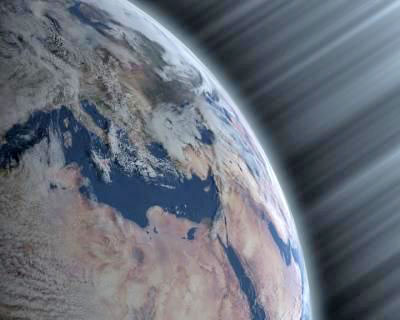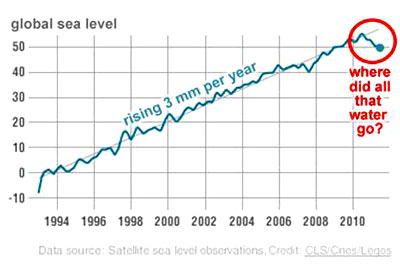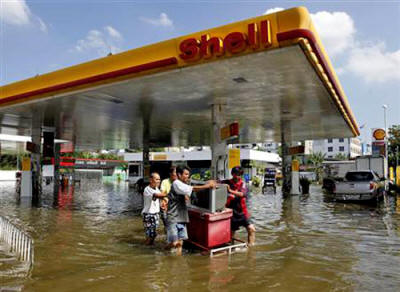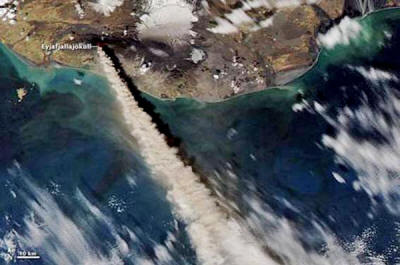|
Director 17 November 2011 from IMVA Website
Extreme weather events are hitting
human populations around the globe with no sign of any letup.
The year 2010 was one the worst years in
world history for We are witnessing terrible flooding occurring in country after country, particularly hard in Italy and France as of late and it’s not clear how much longer insurance companies can keep paying for claims.
Even the United States government is running out of emergency funds and has trouble voting in more.
And when the funds are voted in, it is not real money that
is available to repair damages and help disaster victims. It’s funny
money, almost counterfeit because it is created out of thin air with
more debt creation.
2011 has already seen more
billion-dollar The Associated Press printed:
Floods are wreaking havoc around the world:
The water is certainly coming from somewhere and according a NASA report, worldwide rainfall and snowfall were so extreme in so many places last year that sea levels fell dramatically.
Sea levels have been rising steadily for over a century (some debate this assumption) as the ever-warmer ocean water expands and the world’s remaining glaciers and ice sheets melt.
In fact sea levels were thought to be rising twice as fast now as they were a few decades ago but now we have had an almost instant turnaround. Nothing in the modern satellite record comes close to the 6 mm drop worldwide last year.
While 6 mm might not sound like a lot, when collected from the surface of all our planet’s oceans it adds up to 26,000 gallons of water per human.
The amount of ultra fine condensation nuclei (UFCN) material depends on the quantity of the background drizzle of cosmic rays. Normally this quantity varies depending on the strength of the sun’s magnetic field and the strength of the Earth’s magnetic field.
But lately
there seems to be an unexplained increase in cosmic rays and this is
troubling scientists.
Henrik Svensmark of the Danish Space Research Institute cloud chamber experiment showed natural cosmic rays quickly created vast numbers of tiny “cloud seeds.”
Since clouds often cover 30 percent of the earth’s surface, a moderate change in cloud cover clearly could explain the warming/cooling cycle. Svensmark noted the gigantic “solar wind” that expands when the sun is active - and thus blocks many of the cosmic rays that would otherwise hit the earth’s atmosphere.
When the sun weakens,
the solar wind shrinks. Recently, the U.S. Solar Observatory
reported a very long period of “quiet sun” and predicted 30
years of cooling.
Scientists know of no source close enough to produce this pattern.
It’s a mystery because the hotspots must be produced within about 0.03 light years of Earth.
Further out, galactic magnetic fields should deflect the
particles so much that the hotspots would be smeared out across the
sky. But no such sources are known to exist.
Crossing those limits may not rock the Earth itself, but would lead to harsh consequences for human existence on the planet as we know it. It does seem like we have crossed that boundary and have done so very quickly.
In 2011 natural
disaster has been the rule not the exception with flooding taking
first place in how Nature is striking at us. All one has to do is look around to witness the world drowning in floods.
Thousands of Bangkok residents flocked to bus, rail and air terminals in an exodus from the mass of floodwater that hit the city. Water was seeping into central areas of the city of 12 million people, entering the grounds of the Grand Palace after the main Chao Phraya river overflowed at high tide.
The
floods forced the closure of seven industrial estates in Ayutthaya, Nonthaburi and Pathum Thani provinces bordering Bangkok, causing
billions of dollars of damage, disrupting supply chains for industry
and putting about 650,000 people temporarily out of work.
On the 25th more than 90 people were counted dead from heavy rains pounding Central America after Guatemala reported more people swept away by raging floodwaters and Costa Rica found four drowned.
An estimated 700,000
people were displaced by floods and landslides following as much as
120 centimeters (47 inches) of rain in the past week in some areas -
three times the monthly average this season - officials said. The
week before had people killed by a week of torrential rains in El
Salvador.
And Dublin’s officials began the onerous task of piecing the capital back together again on Tuesday after a torrential downpour the day before swelled the city’s main waterways, causing them to burst their banks.
Water spilled over into the streets, and the flooding quickly prompted Dublin’s City Council to enact its “major emergency plan.”
Researchers have analyzed how many
secondary particles of volcanic ash generates and how this ash
reacts chemically with other components of the atmosphere. The
particles created from the eruptions are mostly composed of sulfuric
acid.
The atmospheric data the researchers collected during the Eyjafjallajökull eruption (below image) suggest that volcanic eruptions can release up to 100 million times more ash particles than thought.
In addition, seeding particles can form at lower altitudes and farther distances from volcanoes than past studies had suggested.
The findings, detailed online on July 11 in the journal Proceedings of the National Academy of Sciences, point to the potentially broader climate influence that volcanoes could have.
Conclusion
The worst danger though is to the world’s agricultural system, which is taking a beating from the flooding as the human race breaks through the seven billion mark. Even before this year’s record disasters, world food stocks were getting dangerously low.
The poor peoples of the world
are paying more dearly for their food as a result, meaning many are
eating less.
We have entered one of the most difficult
and perhaps dangerous periods of our existence; and it comes after
60 years of television and the easy life for too many people who
will not do well when the going gets tougher.
|




